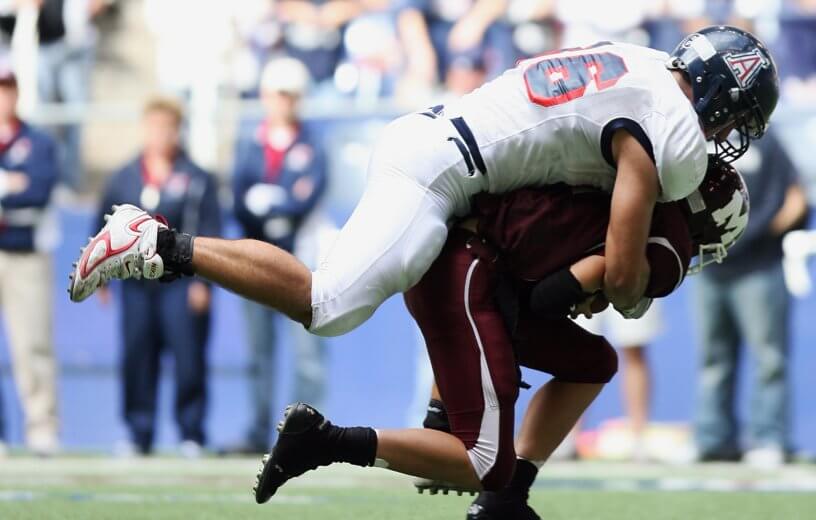- Researchers discover hard-nosed athletes naturally tend to suspend their sense of right-and-wrong when on the field.
- Players more likely to engage in antisocial behavior for the sake of victory — or to avoid punishment by their coaches.
BIRMINGHAM, England — Competing in sports as a child is supposed to be a fun way to teach children about important characteristics like sportsmanship, teamwork, hard work, and discipline. While that may be the case off the field, a new comprehensive assessment of on-field behavior concludes that athletes largely put their morals and ethics aside when they step foot on the playing field.
Researchers at the University of Birmingham in England and Sultan Qaboos University in Oman say this behavior can largely be traced back to a belief that athletes are not as responsible for their actions during the course of a game than they would be during everyday life.
Athletes often view game situations as either an opportunity to earn a reward (a victory), or avoid punishment (reprimand from the coach; harder and more intense practice sessions). As such, they are much more likely to act in an immoral or antisocial manner in order to win and or show off their athletic ability, the study’s authors say.
Furthermore, especially intense and competitive coaches seem to bring out the worst in their players. This is because the players know, even if only subconsciously, that they will be in for a verbal tirade if their play is deemed “not good enough” by their coach.
To come to these findings, researchers analyzed 27 previous studies conducted on “prosocial” and “antisocial” behavior in sports and among athletes.
“Certain conditions in sport may lead athletes who are relatively upstanding individuals in everyday life to suspend their sense of right and wrong when they step into a competitive sporting arena,” comments study author Dr. Maria Kavussanu in a statement. “In the pursuit of victory, coaches may ask players to cheat or injure their opponents, and players may see their teammates doing this. It may be easier to morally disengage in sport because responsibility for one’s inappropriate actions can be displaced onto others.”
This tendency among athletes to put aside their morals on the playing field is described as “bracketed morality,” by the research team. Additionally, they noted that athletes are much more likely to show off their athletic abilities during an actual in-game situation compared to a practice session. With all of this in mind, the study concludes that athletes who participate in sports solely to win prizes, show off their own skills, and avoid feelings of shame or incompetence, are much more likely to act unethically and exhibit antisocial behavior on the playing field.
Coercive and controlling behavior among coaches seems to be a significant predictor of immoral behavior among athletes. The study cites practices such as controlling language, rewards and incentives being offered for strong performances, and even manipulating athletes’ feelings and emotions as common practices among many coaches. This controlling behavior from coaches can in turn lead to athletes becoming morally disengaged and internally justifying acting antisocially and ruthlessly on the playing field.
So how does both prosocial and antisocial behavior among athletes influence their teammates? Researchers say prosocial behavior towards an athlete from their teammates, including encouragement and support, usually results in the athlete exerting more effort and turning in a better performance. For example, adult soccer and basketball players who felt like their teammates were acting especially positive towards them during a game enjoyed playing more, performed better, put in more effort, and were more committed to their team in general.
Prosocial behavior towards teammates can also help prevent psychological, physical, and emotional burnout among athletes, according to the study.
On the other hand, antisocial behavior directed towards teammates can encourage additional stress and improved odds of burnout. Athletes who were routinely verbally abused by their own teammates reported elevated levels of anxiety. It’s common for teammates to express frustration amongst one another following a particularly poor loss, but athletes who are routinely subjected to criticism regarding their performances by their own teammates can be left unable to properly perform within in-game situations. They may also struggle in coping with the overall demands of the sport they are playing.
All that being said, researchers also noted that in one instance basketball players exposed to antisocial behavior from their teammates actually performed better than players who were not in a two-minute free-throw shooting competition. So, in some scenarios, negative behavior in short doses towards teammates may actually act as a motivator for some athletes. However, researchers are fairly certain that prolonged antisocial and negative remarks towards an athlete will virtually never result in improved play.
The study is published in the International Journal of Sport and Exercise Psychology.
